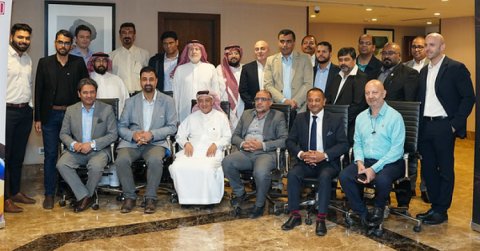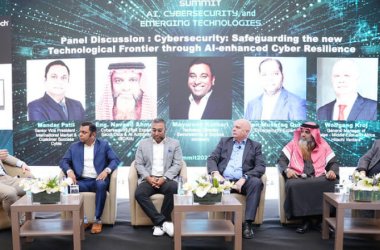
Hitachi Vantara, a global leader in data infrastructure hosted an exclusive roundtable entitled ‘Lead with Intelligence, compete with data and win with trust’ in Riyadh on May 22nd.
The event brought together industry leaders and technology experts to explore evolving trends in AI infrastructure, hybrid cloud strategies, cyber resilience, and ethical AI. Moderated by Rehan Shahid, Regional Channel & Alliances Manager – Middle East & Pakistan at Hitachi Vantara, the session facilitated open dialogue among participants from public and private sector entities including ministries, financial services, and multinational organisations.
The roundtable session had participants that contained IT personnel from the Ministry of Finance, a number of prominent Saudi holding companies, and entities operating in the FinTech and consulting space across the Kingdom.
Key Highlights:
1. Defining Cyber Resilience
The session began with a discussion on cyber resilience versus cybersecurity. Rehan emphasised that resilience is the ability of an organisation to recover from disruptions such as ransomware attacks—resuming operations swiftly post-incident.
“Cybersecurity is about prevention, while cyber resilience ensures recovery”, said Rehan.
The group acknowledged regulatory frameworks such as the EU’s DORA (Digital Operational Resilience Act) and similar emerging standards in the Middle East.
2. Hybrid and Multi-Cloud Strategies
The discussion highlighted the shift from a public-cloud-only narrative to hybrid cloud adoption. According to Rehan, only 17-18% of workloads reside on public cloud, while the majority are managed through hybrid or private cloud setups. This was echoed by the Ministry of Finance, which is actively transitioning to certified cloud providers under regulatory supervision.
3. AI Readiness and Data Strategy
Participants agreed that AI is a key driver of enterprise transformation. However, its success depends heavily on data quality and readiness.
A fintech CTO shared concerns about over-reliance on AI: “AI is powerful, but it’s not universally applicable. Data integrity and contextual ROI are critical”.
Rehan emphasised that AI must be validated with clean, structured data to avoid “garbage-in, garbage-out” outcomes. He introduced the concept of “agentic AI”—AI capable of making autonomous decisions—and noted that Hitachi has already implemented such use cases internally.
4. AI Investment Across the Middle East
The region is witnessing unprecedented AI investment. Examples included:
- Saudi Arabia’s $5B AI data centre project in NEOM.
- UAE’s goal of becoming the first AI-native government by 2027.
- Abu Dhabi’s $500M Stargate Project and planned €50B investment in AI data infrastructure in France.
Al Patel, Head Of Distribution Sales & Technical Alliances EMEA And Channel Sales Director MEA, Hitachi Vantara, noted, “Analysts predicted $15B in UAE AI investment by 2026. But we’re already there. The market is outpacing predictions”.
5. Ethical AI and Governance
The session explored challenges around fairness, accountability, and privacy in enterprise AI.
“No large language model is bias-free”, Rehan explained. “Transparency and trust must be built into AI models, especially in regulated industries”.
6. AI Infrastructure Needs
Hitachi shared insights from a survey of 800 global enterprise customers, including BMW, Citibank, and NASA. Key findings:
- Top priorities: Reliability, flexibility, and scalability.
- Deployment preference: 78% prefer on-premises infrastructure for performance and control.
- Technology Shift: GPUs are becoming core to AI workloads; Hitachi predicts CPUs may diminish in relevance in the next decade.
7. Introducing Hitachi IQ
Hitachi Vantara unveiled its AI platform, Hitachi IQ, which integrates:
- High-performance storage and compute infrastructure.
- Advanced file systems optimised for AI workloads.
- A modular, scalable architecture in partnership with NVIDIA and Hitachi Limited.
The AI Discovery Service was also launched to help organisations define, validate, and prototype AI use cases across three phases—Discovery Sprint, Advisory Service, and Jumpstart Proof of Concept (POC).
8. Use Case Development & Data Sovereignty
Participants raised concerns about intellectual property and regulatory compliance, especially regarding POC deployments involving sensitive data. Hitachi assured that IP rights remain with customers and emphasised the importance of data residency in solutions offered in-region.
9. Sustainability and Energy Efficiency
As AI data centres consume increasing energy, sustainability was a pressing concern.
“An AI-powered data centre can consume more electricity than an entire city”, Rehan noted.
Hitachi’s VSP (Virtual Storage Platform) was presented as the industry’s most energy-efficient system, with four of the top five Energy Star ratings globally. Their upcoming VSP 360 aims to unify data storage management across SAN, NAS, object, and cloud environments.
10. Closing Remarks: Future of Agentic AI
The roundtable concluded with a look toward the future. Agentic AI—capable of autonomous decision-making—is set to redefine enterprise roles, transforming IT departments into stewards of digital agents.
“Soon, IT will function like HR—provisioning, nurturing, and managing AI agents”, Rehan predicted.
The session reaffirmed Hitachi Vantara’s commitment to enabling data-driven innovation through trusted infrastructure, ethical AI solutions, and industry-specific expertise. As AI adoption accelerates in the region, organisations must strike a balance between innovation, operational readiness, and sustainable growth.
For further engagement, participants were invited to collaborate with Hitachi’s local teams or explore proof-of-concept labs available in the Netherlands and the Middle East.
Image Credit: Hitachi Vantara





